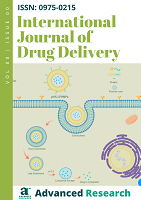Microspheres containing Doxycycline: Properties and in vitro study
Keywords:
Poly(DL-lactide), doxycycline, microspheres, solvent evaporation technique, drug releaseAbstract
PLA microspheres loaded with the antibiotic Doxycycline are prepared using solvent evaporation technique (o/w) by varying the drug masses. They are evaluated for drug encapsulation, drug loading, particle size, morphology, FT-IR, stability and in vitro release. Microspheres loaded with Doxycycline show a maximum drug encapsulation of 38%. They exhibit homogeneous size distribution varying between 80 and 110 øm, with a spherical profile and porous surface. FT-IR study hasnÊt revealed any drug-polymer interaction. After 6 months of storage at different conditions, no appreciable difference is observed concerning the degradation of microspheres. In vitro release study of PLA microspheres loaded with Doxycycline reveals a rather fast release which requires only few hours to go to completion.
References
. Narasimha RR, Sampath KM, Dileep KK,
Vineeth P. Formulation and evaluation of
capcitabine microspheres. Int J Pharm
Tech. 2001;3(2):2599-2632.
. Nidhi G: Development and
characterization of dental films containing
Tetracycline HCl for periodontitis.
MasterÊs thesis. University of Georgia,
Athens; 2004
. Sun Y, Peng Y, Chen Y, Shukla AJ.
Application of artificial neural networks in
the design of controlled release drug
delivery systems. Adv Drug Deliv Rev.
;55(9):1201ă1215.
. Hanwei Z, Jianzhong B, Shenguo W.
Preparation and drug release behaviors
of 5-Fluorouracil Loaded poly(glycolideco-lactide-co-caprolactone) nanoparticles.
J Appl Polymer Sci. 2007;106(6):3757-
. Heidi MM, Sohn MJ, Al-Ghananeem A,
DeLuca PP. Materials for Pharmaceutical
Dosage Forms: Molecular pharmaceutics
and controlled release drug delivery
aspects. Int J mol sci. 2010;11(9):3298-
. Sadeghi M. Pectin-based biodegradable
hydrogels with potential biomedical
applications as drug delivery systems. J
Biomater Nanobiotechnol. 2011;2(1):36-
. Giavaresi G, Tschon M, Borsari V, Daly
JH, Liggat JJ, Fini M, Bonazzi V, Nicolini
A, Carpi A, Morra M, Cassinelli C,
Giardino R. New polymers for drug
delivery systems in orthopaedics: in vivo
biocompatibility evaluation. Biomed
Pharmacother. 2004;58(8):411ă417
. Seyednejad H, Ghassemi AH, Van
Nostrum CF, Vermonden T, Hennink WE.
Functional aliphatic polyesters for
biomedical and pharmaceutical
applications. J Contr Release.
;152(1):168-176
. Letizia MM: Chitosan and plga
microspheres as drug delivery system
against pulmonary mycobacteria
infections. PhD thesis. University of
Cagliari, Department Farmaco Chimico
Tecnologico, Italy; 2009
. Perrin DE, English JP. Polyglycolide and
polylactide. In: Domb AJ, Kost J,
Wiseman DW, editors. Handbook of
Biodegradable Polymers. Harwood
Academic Publishers, Amsterdam; 1997.
p.1ă27
. Ruan G, Feng SS. Preparation and
characterization of poly(lactic acid)ă
poly(ethylene glycol)ăpoly(lactic acid)
(PLAăPEGăPLA) microspheres for
controlled release of paclitaxel.
Biomaterials. 2003;24(27):5037-5044
. Suong-Hyu H. Biodegradable poly(lactic
acid) microspheres for drug delivery
systems. Yonsei Med J. 2000;14(6):720-
. Shenoy DB, DÊSouza, RJ, Udupa N.
Poly(DL-lactide-co-glycolide) microporous
microsphere-based depot formulation of a
peptide-like anti-neoplastic agent. J
Microencapsul. 2002;19(4):523ă535
. Dinarvand R, Moghadam SH,
Mohammadyari-Fard L, Atyabi F.
Preparation of biodegradable
microspheres and matrix devices
containing Naltrexone. AAPS
ParmSciTech. 2003;4(3):45-54
. Fernandez-Carballido A, Herrero-Vanrell
R, Molina-Martinez IT, Pastoriza P.
Sterilized ibuprofen-loaded poly (D,Llactide-co-glycolide) microspheres for
intra-articular administration: effect of
gamma-irradiation and storage. J
Microencapsul. 2004;21(6):653ă665
. La SB, Okano T, Kataoka K. Preparation
and characterization of the micelleforming polymeric drug indomethacinincorporated poly(ethylene oxide)-
poly(beta-benzyl L-aspartate) block
copolymer micelles. J Pharmaceut Sci.
;85(1):85ă90
. Giovagnoli S, Tsai T, DeLuca PP.
Formulation and release behavior of
doxycycline-alginate hydrogel
microparticles embedded into pluronic
F127 thermogels as a potential new
vehicle for Doxycycline intradermal
sustained delivery. AAPS PharmSciTech.
;11(1):212ă220
. Standiford HC: Tetracyclines and
chloramphenicol. In: Mandell GL, Douglas
RG, Bennett JE, editors. Principles and
practice of infectious diseases. Churchill
Livingstone, Inc., New York; 1990. p.284-
. Aurer A, Plancak D. Antimicrobial
treatment of periodontal diseases. Acta
Stomatol Croat. 2004;38(1):67-72
. Yoon Y, Kinam P. Control of
Encapsulation Efficiency and Initial Burst
in Polymeric Microparticle Systems. Arch
of pharm Res. 2004;27(1):1-12
. Mehta RC, Thanoo BC, DeLuca PP.
Peptide containing microspheres from low
molecular weight and hydrophilic
poly(D,L-lactide-co-glycolide). J Contr
Release. 1996;41(3):249- 257
. Chung TW, Huang YY, Liu YZ. Effect of
the rate of solvent evaporation on the
characteristics of drug loaded PLLA and
PDLA microspheres. Int J Pharm.
;212(2):161-169
. Okada H, Toguchi H. Biodegradable
microspheres in drug delivery. Crit Rev
Ther Drug Carrier Syst. 1995;12(1):1-99





